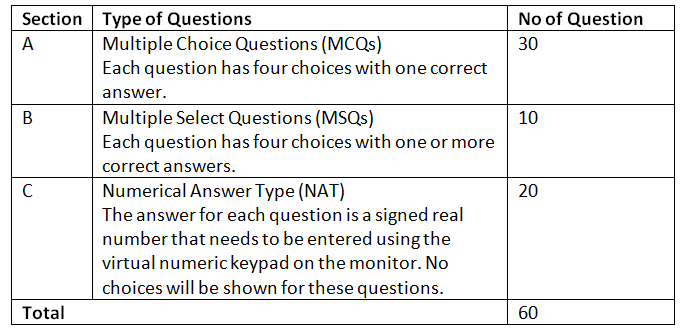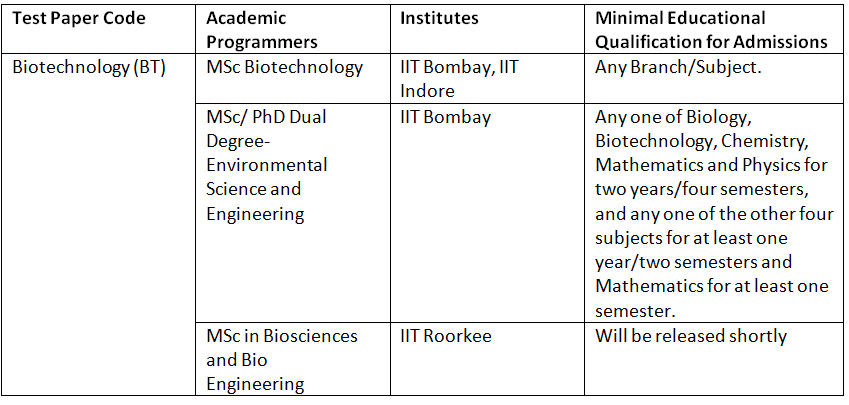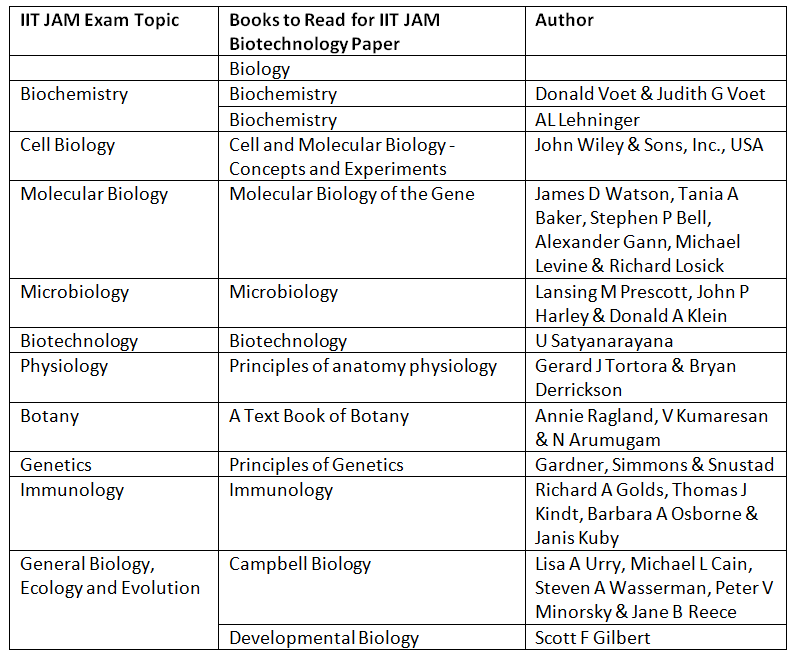IIT JAM 2025 Biotechnology Syllabus: Subject Wise Syllabus, Exam Pattern & Important Books | Mock Test Series of IIT JAM Biotechnology 2026 - Biotechnology Engineering (BT) PDF Download
IIT JAM 2025 Biotechnology Exam Pattern
IIT JAM 2025 Biotechnology exam pattern states that each test paper is of three hours duration. In the exam, candidates need to attempt 60 questions which were of 100 marks weightage. These 60 questions are divided into three sections – A, B, and C. All these sections are compulsory and candidates need to attempt questions from all the sections. The medium of instruction for JAM test papers is English.
The detailed IIT JAM exam pattern 2025 is mentioned in the table below:
CUET PG 2025 Biotechnology: Eligibility Criteria
Candidates can check the minimal eligibility criteria for enrolling in MSc Biotechnology course from below:
IIT JAM 2025 Biotechnology Syllabus
Aspirants preparing for the IIT JAM MSc Biotechnology degree programme should start their preparation according to the Biotechnology syllabus mentioned below:
The Biotechnology (BT) Test Paper comprises Biology, Chemistry, Mathematics and Physics
Biology Syllabus (10 + 2 + 3 level)
- Cell Biology: Structure of prokaryotic and eukaryotic cells; Membrane structure and function; Organelles and internal organization of the eukaryotic cell Protein trafficking in a eukaryotic cell; Cell communication – signalling pathways: endocrine and paracrine signalling; Extracellular matrix and apoptosis; Cell cycle – stages of mitosis and meiosis, and control of cell division cycle.
- Biochemistry: Structure and function of biological macromolecules; Allostery; Enzymes – basic mechanisms of enzyme catalysis, Michaelis-Menten kinetics, enzyme inhibition, vitamins as coenzymes, and regulation; Bioenergetics – free-energy change, high-energy compounds, biological oxidation-reduction reactions and reduction potential; Metabolism – glycolysis, TCA cycle, oxidative phosphorylation, photosynthesis, nitrogen fixation, urea cycle, and regulation of glycolysis and TCA cycle.
- Genetics: Mendel’s laws; Inheritance patterns of polygenic traits; Mendelian inheritance patterns of human disorders; Pedigree analysis; Chromosomal basis of inheritance; Genetic recombination; Mapping genes on chromosomes based on linkage analysis; Plant breeding.
- Molecular Biology: Landmark experiments that established DNA is the genetic material; DNA replication; Proof-reading and repair of DNA; DNA recombination; Transcription; RNA processing; Translation; Regulation of gene expression including operons bacteria and differential gene expression in multicellular eukaryotes.
- Evolution: Darwinian view – natural selection, fossil record and descent with modification; Population genetics – sources of genetic variation, gene pools and allele frequencies, Hardy- Weinberg equation, genetic drift, gene flow and adaptive evolution; Different types of speciation; Phylogenetic classification; Origin of life – abiotic synthesis of biological macromolecules, protocell, dating fossils and origin of multicellularity.
- Microbiology: Isolation; Cultivation; Structural features of viruses, bacteria, fungi and protozoa; Pathogenic microorganisms; Nutrition-based classification of microbes; Microbial metabolism; Growth kinetics; Submerged fermentation techniques; Microbial genetics.
- Plant Biology: Types of tissues and organs; Primary and secondary growth; Morphogenesis; Transport in vascular plants; Plant nutrition; Development of flowering plants – gametophytic
- and sporophytic generations, different developmental phases, genetic control of flowering, gametogenesis, incompatibility, embryogenesis, dormancy, germination and environmental influence; Plant hormones; Photobiology; Plant response to biotic and abiotic stresses.
- Animal Biology: Digestive, circulatory, respiratory, excretory, nervous, reproductive and endocrine systems; Basics of immunology – Innate and adaptive immunity, Immune cells and
- Immunoglobulins; Animal development – Fertilization, embryonic pattern formation, cleavage, gastrulation, cellular differentiation and morphogenesis.
- Ecology: Climate patterns; Terrestrial and aquatic biomes; Environmental constraints on species distribution; Factors affecting population density; Interactions among communities;
- Ecosystems; Ecological remediation.
- Biotechnology: Plant tissue culture; Cloning of animals through somatic cell nuclear transfer; Applications of recombinant DNA technology in medicine, agriculture and forensic science.
Methods in Biology:
- Cell Biology: Microscopy (light microscopy and electron microscopy); Staining proteins with antibodies; Visualizations using the GFP reporter.
- Biochemical techniques: UV spectrophotometry; Biomolecular chromatography; cell fractionation by centrifugation; Electrophoresis; and Western blotting.
- Molecular biology techniques: DNA cloning – plasmid vectors, and restriction enzymes; Polymerase Chain Reaction; Expression of cloned eukaryotic genes in bacteria; Hybridization techniques; DNA sequencing.
Chemistry Syllabus (10 + 2 + 3 Level)
- Structure and properties of Atoms: Bohr's theory; Periodicity in properties.
- Bonding in molecules: Chemical bonding; Complex formation; Physical and chemical basis of molecular interactions. Chemical kinetics, thermodynamics, and equilibrium: Chemical equilibrium; Chemical thermodynamics (first and second law); and Chemical kinetics (zero and first order reactions).
- Physical and chemical properties of compounds: Chemical catalysis; Acid-base concepts; Concepts of pH and buffer; Conjugative effects and resonance; Inductive effects; Electromeric effects; Photochemistry; and Electrochemistry.
- Chemistry of organic compounds: Hydrocarbons; Alkyl halides; Alcohols; Aldehydes; Ketones; Carboxylic acids; Amines and their derivatives; Aromatic hydrocarbons, halides, nitro and amino compounds, phenols, diazonium salts, carboxylic and sulphonic acids; Soaps and detergents; Stereochemistry of carbon compounds.
- Instrumental techniques - Spectroscopy: fundamentals of molecular spectroscopy, emission and absorption spectroscopy, UV-Vis, IR and 1-D proton NMR spectroscopy, basics of mass spectrometry; Basics of calorimetry; Basic concepts of crystallography.
Mathematics Syllabus (10 + 2 Level)
- Sets; Relations and Functions; Mathematical Induction; Logarithms; Complex numbers; Linear and Quadratic equations; Sequences and Series; Trigonometry; Cartesian System of Rectangular Coordinates; Straight lines and Family; Three Dimensional Geometry; Permutations and Combinations; Binomial Theorem; Vectors; Matrices and Determinants; Boolean Algebra; Functions; Limits and Continuity; Differentiation; Ordinary Differential Equations; Application of Derivatives; Integration as inverse process of differentiation; Definite and indefinite integrals;
- Methods of Integration; Integration by parts.
- Statistics: Measures of dispersion; Mean Deviation for grouped and ungrouped data; Variance and
- Standard Deviation; and Analysis of Frequency Distribution.
- Probability: Random Experiments; Event; Axiomatic Approach to Probability; Conditional Probability and its properties; Multiplication Theorem on Probability; Independent Events; Bayes’ Theorem; Random Variables and its Probability Distributions; Bernoulli Trails and Binomial Distributions.
Physics (10 + 2 Level)
- Units and measurements; Motion in one and two dimensions; Laws of motion; Work and kinetic energy; Conservation of energy; System of particles and rotational motion; Mechanical properties
- of solids and fluids; Thermal properties of matter; Heat and laws of thermodynamics; Kinetic theory of gases; Electric charge and field; Electric potential and capacitance; Current, resistance and
- simple circuits; Moving charges and magnetic field; Magnetism and matter; Electromagnetic induction; Electromagnetic waves; Alternating currents; Optics: Geometrical Optics – Reflection by
- spherical mirrors, Refraction at spherical surfaces and lenses, Total internal reflection and Optical instruments; Wave optics – Reflection and refraction of plane waves, Interference, Diffraction,
- Polarization, and Young’s experiment: Dual nature of radiation and matter; Atoms, nuclei and nuclear physics; Semiconductor materials, devices and simple circuit.
Topics to Study for IIT JAM Biotechnology Exam
The weightage of questions asked in the IIT JAM Biotechnology paper is as mentioned below:
Candidates can go through important topics that they should study to score well in the IIT JAM Biotechnology exam in the table mentioned below:
IIT JAM Biotechnology Books to Read for IIT JAM 2025 Examination
Books that aspirants should consider reading for Biology, Chemistry, Physics, Mathematics and its subtopics are as mentioned below:
To get the details about the books to read for other subjects like Chemistry, Physics and Mathematics, candidates can go through the article which is mentioned below:
Preparation Tips For IIT JAM 2025 MSc Biotechnology Exam
Here are some tips that aspirants can refer to while preparing for the MSc Biotechnology exam:
- Understand the syllabus and exam pattern: The first step is to thoroughly understand the syllabus and exam pattern for the MSc Biotechnology exam. This will help you to focus your studies and identify the topics that you need to cover in more detail.
- Make a study plan: Once you understand the syllabus and exam pattern, you can create a study plan. This plan should be realistic and achievable, and it should break down the syllabus into manageable chunks.
- Use good study materials: There are many books and online resources available to help you prepare for the MSc Biotechnology exam. Choose study materials that are comprehensive and up-to-date.
- Take notes: As you study, take notes on the important concepts and ideas. This will help you to remember the information more easily.
- Practice solving MCQs: The IIT JAM MSc Biotechnology exam is a multiple-choice exam, so it is important to practice solving MCQs on various topics in the syllabus. This will help you to get familiar with the format of the exam and to identify your strengths and weaknesses.
- Revise regularly: Revision is essential for any exam, but it is especially important for the MSc Biotechnology exam, which has a vast syllabus. Make sure to revise regularly and to focus on the topics that you find difficult.
IITs Offering MSc in Biotechnology and Seats
Aspirants can secure admission in the MSc Biotechnology course offered at the below-mentioned colleges:
|
7 docs|34 tests
|





















